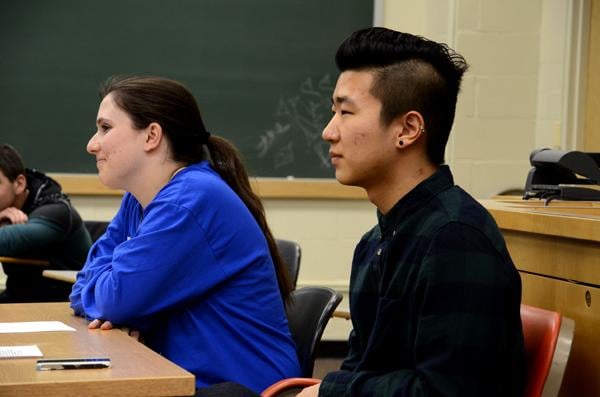Rainbow Alliance, Greek councils host talk on being LGBTQ in Greek life

Annabel Edwards/Daily Senior Staffer
Weinberg sophomores Hannah Merens and Bo Suh moderate an open table discussion Monday night on being LGBT in the greek community at Northwestern. The discussion took place in Kresge Hall and focused on improving inclusivity.
February 24, 2014
Rainbow Alliance hosted a discussion Monday about coexisting as part of the LGBTQ and Greek communities.
Called “Out and Greek,” the discussion was led by Rainbow Alliance members, along with representatives from the Panhellenic Association and Interfraternity Council. The talk covered a number of topics, including heteronormativity within the Greek community.
“We don’t really talk about heteronormativity as a risk within the Greek community,” said Weinberg sophomore Hannah Merens, vice president of risk management for PHA and a member of Delta Delta Delta.
To open the discussion, each person in attendance introduced themselves, gave their preferred gender pronouns and said whether they are affiliated with a fraternity or sorority. After introductions, the event was open to dialogue between attendees and the moderators, Merens and Bo Suh, a Weinberg sophomore and programming committee member for Rainbow Alliance.
Heteronormativity is “an underlying assumption that everyone identifies as heterosexual,” Suh said.
SESP junior Peter Podlipni, a member of Omega Delta Phi, said he found fraternity parties to be heteronormative because they did not usually let men in if they are not with a large group of women. As a cisgender gay male, Podlipni said he feels as if there is no point in attending these events, because “they don’t want me there anyway.”
Merens said the idea of being inclusive is embedded in the values of fraternities and sororities and should be exercised.
“Heteronormativity is everywhere, even on this campus,” she said. “If we’re not being as inclusive as possible, then we’re not being true to these values. At the end of the day, it should be about respect and inclusion and having compassion.”
The conversation then shifted to suggestions for how Greek communities can have a conversation about LGBTQ issues.
“Our biggest issue in the Greek community regarding LGBT is that we don’t explicitly talk about it,” said Communication junior Shivani Chanillo, president of Kappa Delta. “Within our chapters, we don’t know how to have that conversation.”
Attendees then broke up into small groups for a few minutes to discuss different ways to increase inclusion within the Greek system. Suggested ideas included programming for queer events such as National Coming Out Day, outreach to Greek members who don’t identify as LGBTQ and more communication about LGBTQ-related events.
Amid these suggestions, some recognized that Greek organizations can be resistant to change. Likewise, those unaffiliated in the Greek system can be quick to make judgments about these groups.
“I feel like a lot of the stigma comes from people who are unaffiliated,” said Aimee Hechler, a Communication junior and Rainbow Alliance executive board member. Hechler, who identifies as gay, is unaffiliated.
The discussion ended with a conversation on the importance of diversity. Merens said it is crucial for students to associate with people with different experiences than their own.
“What can we do, non-Greeks and Greeks, to make it that all the people you spend time with are different than you?” she said. “The framework is really important.”
Email: [email protected]
Twitter: @OliviaExstrum

